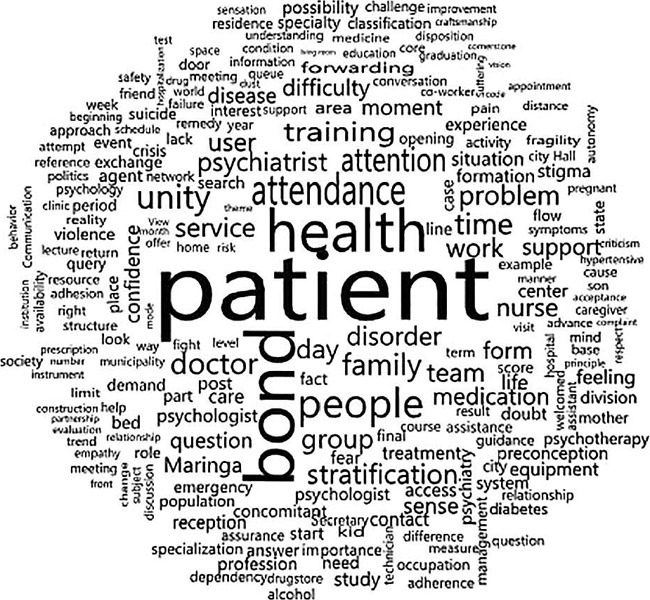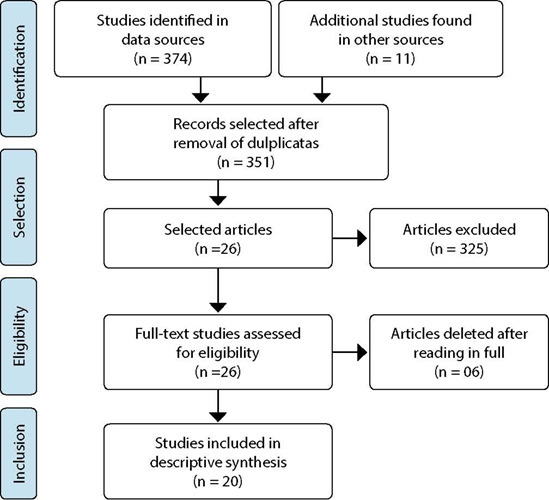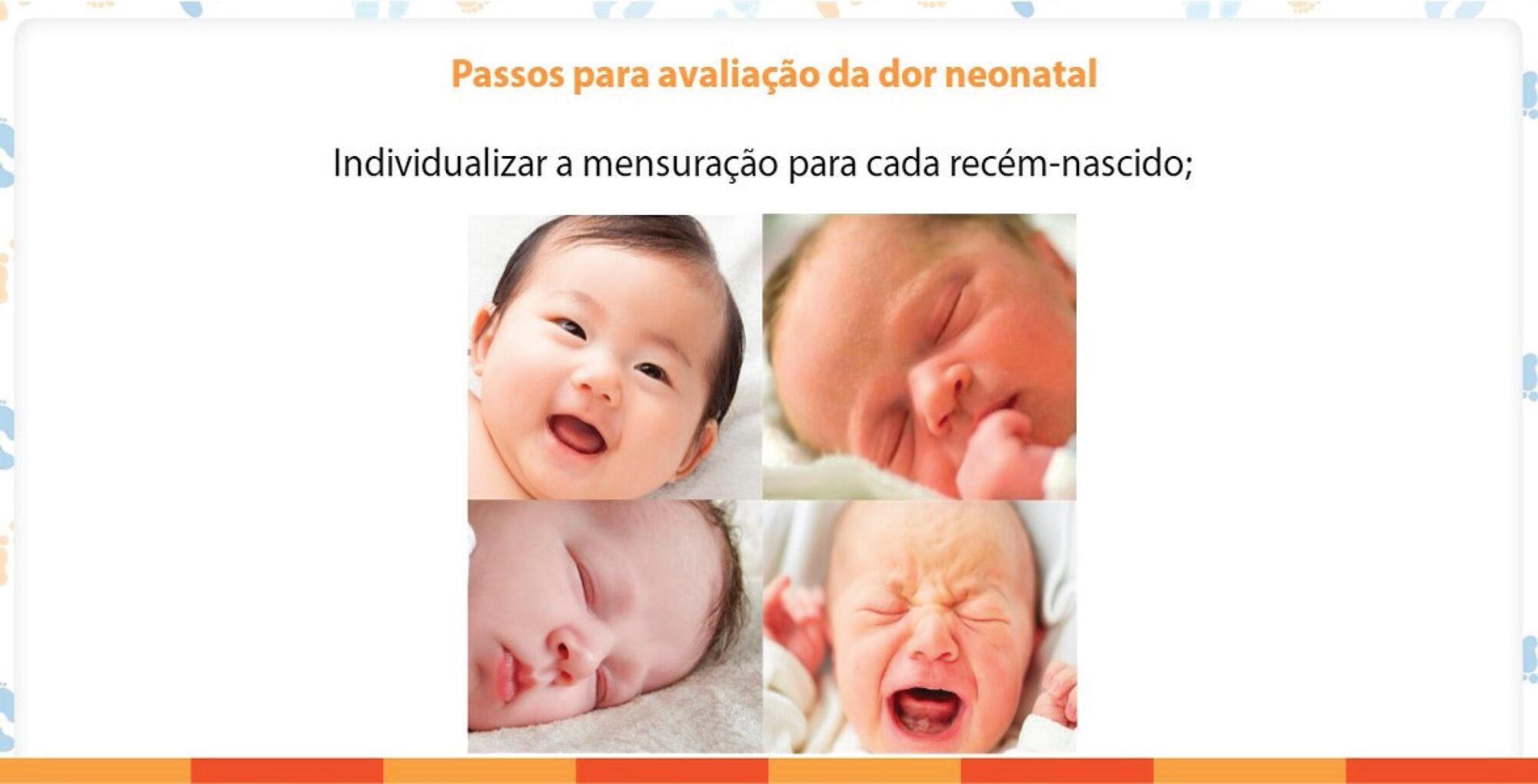-
ORIGINAL ARTICLE11-26-2022
Transitional care of nurses to older adults with artificial pacemaker
Revista Brasileira de Enfermagem. 2022;75:e20210192
Abstract
ORIGINAL ARTICLETransitional care of nurses to older adults with artificial pacemaker
Revista Brasileira de Enfermagem. 2022;75:e20210192
DOI 10.1590/0034-7167-2021-0192
Views0See moreABSTRACT
Objective:
to understand how the transitional care of nurses to olde adults with artificial pacemaker occurs.
Method:
a qualitative research, carried out in a philanthropic hospital in the city of Salvador, Bahia, Brazil. Fourteen nurses working in surgical and cardiac inpatient units participated. Data were collected between August and November 2020, through semi-structured interviews, and analyzed using the methodological framework Discourse of the Collective Subject and discussed in the light of Afaf Meleis’ theory of transitions.
Results:
nurses’ incipient knowledge about transitional care was identified. It was observed that the nursing discharge report is a facilitating instrument for transitional care.
Final considerations:
the study pointed out that the transitional care of nurses to older adults with artificial pacemakers does not have a theoretical foundation, reporting as a priority the care with the pacemaker identification card and with the surgical wound.
-
ORIGINAL ARTICLE11-26-2022
Mental health assistance in Primary Care: the perspective of professionals from the Family Health Strategy
Revista Brasileira de Enfermagem. 2022;75:e20190326
Abstract
ORIGINAL ARTICLEMental health assistance in Primary Care: the perspective of professionals from the Family Health Strategy
Revista Brasileira de Enfermagem. 2022;75:e20190326
DOI 10.1590/0034-7167-2019-0326
Views0See moreABSTRACT
Objective:
To learn about the perceptions of the professionals who work in Primary Health Care about mental health care.
Methods:
Descriptive and qualitative study, carried out with 29 health workers through open and individual interviews. The IRaMuTeQ® software was used to organize the data which, then, was submitted to a content analysis process in the thematic modality.
Results:
Three classes emerged from the content analysis: “Perceptions about the mental health care provided in the city”, “The biomedical paradigm in mental healthcare”, and “Elements for the construction of a new way for professionals to act in mental health”.
Final considerations:
It was found that, despite the good infrastructure of the services and the elements pointed at by the professionals to create a new way to act, they do not do so, and the responsibility falls, mostly, on the psychologist to carry out these activities.

-
REVIEW11-26-2022
Parental burnout: a scoping review
Revista Brasileira de Enfermagem. 2022;75:e20210203
Abstract
REVIEWParental burnout: a scoping review
Revista Brasileira de Enfermagem. 2022;75:e20210203
DOI 10.1590/0034-7167-2021-0203
Views0See moreABSTRACT
Objective:
to map available evidence on parental burnout theme.
Method:
scoping review as according to the Joanna Briggs Institute. Search in January 2021, in six databases of publications in English, Portuguese or Spanish, without time limits. Data extracted and descriptively analyzed by three independent researchers.
Results:
374 articles were identified and 20 were included in the final sample, all published in English, from 2017 onwards. Parental burnout is a complex, multifactorial problem, distinct from burnout cases, depressive symptoms and other mental health alterations. It affects 0.2 to 20% of parents, has validated and suitable instruments for measurement; if not treated, can have consequences on marital life, work relationships, child neglect and violence.
Conclusions:
this is a recent theme that needs to be explored, due to the possible impact on children’s and families’ health and on parents’ work processes. Protocol registered in the Open Science Framework ().

-
ORIGINAL ARTICLE11-26-2022
Religiosity and spirituality in mental health: nurses’ training, knowledge and practices
Revista Brasileira de Enfermagem. 2022;75:e20200345
Abstract
ORIGINAL ARTICLEReligiosity and spirituality in mental health: nurses’ training, knowledge and practices
Revista Brasileira de Enfermagem. 2022;75:e20200345
DOI 10.1590/0034-7167-2020-0345
Views0See moreABSTRACT
Objective:
to analyze nurses’ training, knowledge and practices in the religiosity/spirituality interface in the context of Psychosocial Care Centers.
Methods:
a descriptive, exploratory, qualitative study, carried out in a metropolitan region of Ceará. Four nurses were interviewed, and the data were examined using the content analysis technique.
Results:
four categories emerged from analysis: Deficit in teaching religious and spiritual practices in higher education in nursing; View of the concept of religiosity and spirituality; Religiousness and spirituality as an integral part of the person; Reception of religious and spiritual practices as an aid to treatment.
Final considerations:
a deficit in nursing undergraduate teaching was identified concerning religiosity and spirituality. However, the interviewed professionals understand the importance of religious and spiritual dimensions in the therapeutic process, even though they do not accurately differentiate the concepts.
-
ORIGINAL ARTICLE11-26-2022
Health beliefs and adherence of the elderly to fall prevention measures: a quasi-experimental study
Revista Brasileira de Enfermagem. 2022;75:e20201190
Abstract
ORIGINAL ARTICLEHealth beliefs and adherence of the elderly to fall prevention measures: a quasi-experimental study
Revista Brasileira de Enfermagem. 2022;75:e20201190
DOI 10.1590/0034-7167-2020-1190
Views0See moreABSTRACT
Objective:
To evaluate the effect of an educational intervention on health beliefs and adherence of elderly people to fall prevention measures.
Methods:
This is a quasi-experimental study, carried out at the Senior Citizens’ Center. Sixty-eight elderly completed the intervention. The intervention consisted of four meetings focused on beliefs about falls and prevention, and the evaluation occurred at baseline and 30 days after completion.
Results:
The elderly were predominantly women (83.82%), with one to four years of schooling (36.76%), with health problems (95.59%), and 48.53% had fallen. There was a significant increase in perceived susceptibility, severity, benefits, barriers, and total health belief score post educational intervention. By adding total to partial adherence, there was a significant increase in the adherence of the elderly to fall prevention measures after the educational intervention.
Conclusion:
Educational intervention was able to improve the beliefs and adherence of the elderly to fall prevention measures.
-
ORIGINAL ARTICLE11-26-2022
Vulnerability and quality of life of older persons in the community in different situations of family care
Revista Brasileira de Enfermagem. 2022;75:e20210034
Abstract
ORIGINAL ARTICLEVulnerability and quality of life of older persons in the community in different situations of family care
Revista Brasileira de Enfermagem. 2022;75:e20210034
DOI 10.1590/0034-7167-2021-0034
Views0See moreABSTRACT
Objective:
to correlate socio-contextual aspects, physical vulnerability and quality of life of older persons in the community in different situations of family care.
Methods:
epidemiological, a cross-sectional and analytical study, with elderly people in the community (n=769), with application of the instruments: Vulnerable Elders Survey-13 (VES-13), World Health Organization Quality of Life for Older Persons (WHOQOL-OLD) and the World Health Organization Quality of Life (WHOQOL-BREF); and socio-contextual data questionnaire.
Results:
the population assessed presented an average of regular quality of life in both the WHOQOL-BREF and the WHOQOL-OLD. Older non-vulnerable persons (62.2%) and those with close family contact (82.6%) have a better quality of life than the vulnerable (p<0.0001).
Conclusion:
lower quality of life scores and more distant families are related to vulnerable elderly people; thus, the assessment of family proximity and physical vulnerability of older persons is shown to be an important factor in improving quality of life.
-
11-25-2022
Populações vulnerabilizadas no contexto da pandemia e crises sanitárias
Revista Brasileira de Enfermagem. 2022;75:e75Suppl201
Abstract
Populações vulnerabilizadas no contexto da pandemia e crises sanitárias
Revista Brasileira de Enfermagem. 2022;75:e75Suppl201
DOI 10.1590/0034-7167.202275Suppl201pt
Views0As condições e os modos de vida da população determinam o processo de saúde e adoecimento de forma diferenciada entre os diversos grupos populacionais. As desigualdades na saúde vêm adquirindo relevância ainda maior na produção de diferentes perfis de doença, em função de recentes e surpreendentes acontecimentos mundiais, como divergências étnico-raciais, religiosas, territoriais, identidade de […]See more -
11-25-2022
Reflections on science in gerontological nursing: possibilities for its path
Revista Brasileira de Enfermagem. 2022;75:e75Suppl401
Abstract
Reflections on science in gerontological nursing: possibilities for its path
Revista Brasileira de Enfermagem. 2022;75:e75Suppl401
DOI 10.1590/0034-7167.202275Suppl401
Views0Scientific knowledge in Brazilian gerontological nursing has its beginnings more than 50 years ago, specifically in the mid-1970s, in line with the worldwide movement to recognize the complexity of population aging and its challenges in the social, cultural, political and public health spheres. Since then, scientific production in this field has been related to the […]See more
-
ORIGINAL ARTICLE07-08-2020
Self-efficacy in elderly with type 2 Diabetes Mellitus
Revista Brasileira de Enfermagem. 2020;73:e20180980
Abstract
ORIGINAL ARTICLESelf-efficacy in elderly with type 2 Diabetes Mellitus
Revista Brasileira de Enfermagem. 2020;73:e20180980
DOI 10.1590/0034-7167-2018-0980
Views0See moreABSTRACT
Objective:
to analyze the self-efficacy of elderly with type 2 diabetes mellitus and the relationship with sociodemographic, clinical, knowledge, and attitude variables.
Method:
a cross-sectional quantitative study conducted with 256 elderly people enrolled in Family Health Strategies. Data were obtained through interviews. Descriptive statistical analysis and multiple linear regression model were performed (p <0.05).
Results:
female, 69.95-year mean age, white skin color, 4-7 years of schooling, living with a partner, retirees, low individual monthly income, 6 to 15 years of illness, Catholics, living with children (with or without spouse). The elderly’s low knowledge and negative attitude prevailed. Self-efficacy was associated with attitude and knowledge in the domains “General and Specific Diet”, “Physical Exercise” and “Blood Glucose”.
Conclusion:
self-efficacy investigations in type 2 Diabetes Mellitus management in the elderly are important and encourage treatment adherence.
-
ORIGINAL ARTICLE09-18-2020
Nursing recommendations for facing dissemination of COVID-19 in Brazilian Nursing Homes
Revista Brasileira de Enfermagem. 2020;73:e20200260
Abstract
ORIGINAL ARTICLENursing recommendations for facing dissemination of COVID-19 in Brazilian Nursing Homes
Revista Brasileira de Enfermagem. 2020;73:e20200260
DOI 10.1590/0034-7167-2020-0260
Views0See moreABSTRACT
Objective:
to develop a protocol of recommendations for facing dissemination of COVID-19 in Brazilian Nursing Homes.
Method:
a study of experts’ recommendations using a structured form applied through the Delphi Technique, obtaining 100% agreement among professionals after four rounds of analysis. The population comprised six nurses members of the Scientific Department of Gerontological Nursing of the Brazilian Association of Nursing (Associação Brasileira de Enfermagem)
Results:
the protocol was structured in a nucleus of nursing interventions to face the spread of COVID-19 in Nursing Homes, consisting of 8 actions.
Final considerations:
the protocol can help nurse managers to organize assistance to face the pandemic, which can be adaptable to each reality, making training nurses and health teams easier.
-
ORIGINAL ARTICLE07-08-2020
Cognition and quality of life relationship among the elderly community: a cross-sectional study
Revista Brasileira de Enfermagem. 2020;73:e20190030
Abstract
ORIGINAL ARTICLECognition and quality of life relationship among the elderly community: a cross-sectional study
Revista Brasileira de Enfermagem. 2020;73:e20190030
DOI 10.1590/0034-7167-2019-0030
Views0See moreABSTRACT
Objective:
to assess cognitive functions and their association with quality of life among elderly people enrolled in a Family Health Unit (FHU) of Primary Health Care in Recife-PE.
Methods:
a quantitative, descriptive, cross-sectional study in which elderly aged 60 years and over were studied.
Results:
76.7% of the elderly were women and the age group was less than or equal to 70 years. 68.6% had cognitive impairment, and in the quality of life assessment it was found that the social participation facet had the highest mean score among the elderly (14.25), while the lowest was observed in the sensory functioning facet (9.10). There was an association between cognitive decline and quality of life.
Conclusion:
most of the elderly had good quality of life rates, but low cognitive level. Using screening tools allows early detection of health problems, guiding the nursing staff in the construction of preventive measures.

-
REVIEW12-05-2019
Health promotion of frail elderly individuals and at risk of frailty
Revista Brasileira de Enfermagem. 2019;72:319-327
Abstract
REVIEWHealth promotion of frail elderly individuals and at risk of frailty
Revista Brasileira de Enfermagem. 2019;72:319-327
DOI 10.1590/0034-7167-2018-0575
Views0See moreABSTRACT
Objective:
To identify interventions for the health promotion of frail elderly individuals and those at risk of frailty.
Method:
Integrative review of the literature performed in the following databases: LILACS, CINAHL, MEDLINE, Web of Science, COCHRANE and Scopus, using the
Descriptors:
“frail elderly”, “aging”, “health services for the aged” and “health promotion” combined with Boolean operators “AND” and “OR”.
Results:
Randomized controlled clinical trials (RCTs) classified as level of evidence II represented 82.6% of studies. Interventions were analyzed according to the following categories: Interventions for the elderly at risk of frailty and Interventions for the frail elderly.
Conclusion:
The following interventions were identified: educational multiprofessional group meetings, physical training, home visit/home care program, nutrition assessment and supplementation, health maintenance programs and cognitive training; models/programs of management and monitoring, use of assistive technology devices and hospitalization program for geriatric rehabilitation.

-
REVIEW12-21-2020
Skill acquisition of safe medication administration through realistic simulation: an integrative review
Revista Brasileira de Enfermagem. 2020;73:e20190880
Abstract
REVIEWSkill acquisition of safe medication administration through realistic simulation: an integrative review
Revista Brasileira de Enfermagem. 2020;73:e20190880
DOI 10.1590/0034-7167-2019-0880
Views0See moreABSTRACT
Objective:
to investigate evidence that indicates the contribution of realistic high, medium or low fidelity simulation to acquire knowledge, skills and attitudes in safe medication administration by nursing students.
Methods:
an integrative review of experimental studies from MEDLINE, LILACS, Web of Science, Scopus and Science Direct. The descriptors “nursing students”, “simulation”, “high fidelity simulation training”, “medication errors” and “pharmacology” were used to identify 14 studies that answered the research question, and were assessed for accuracy methodological level and level of evidence.
Results:
there was a sample of quasi-experimental studies, (level 3 of evidence; 78.6%) and randomized clinical trials (level 2 of evidence; 21.4%), whose expressive majority showed superiority of the simulation strategy over the traditional methodology (71.4%).
Conclusion:
using low and high fidelity simulators, standardized patients and virtual simulation can promote acquisition of essential skills for patient safety.

-
ORIGINAL ARTICLE10-21-2019
Child and adolescent violence: oral story of women who attempted suicide
Revista Brasileira de Enfermagem. 2019;72(6):1450-1456
Abstract
ORIGINAL ARTICLEChild and adolescent violence: oral story of women who attempted suicide
Revista Brasileira de Enfermagem. 2019;72(6):1450-1456
DOI 10.1590/0034-7167-2017-0814
Views0See moreABSTRACT
Objective:
To unveil expressions of intrafamily violence experienced in childhood and/or adolescence by women who attempted suicide.
Method:
This is a study with a qualitative approach based on Oral Story. Participants were ten women with a history of suicide attempt, who experienced intrafamily violence in childhood and/or adolescence. The research was carried out at the Center for the Study and Prevention of Suicide, linked to a Toxicological Information Center in the city of Salvador, Bahia, Brazil.
Results:
From the orality of women, the study allowed the emergence of the following representative categories of intrafamily abuse experienced in childhood and/or adolescence: psychological violence, rejection, neglect, physical violence and sexual violence.
Final considerations:
The study alerts to intrafamily violence as an aggravation related to suicidal behavior, offering elements that help in the identification of their expressions, which will raise awareness to suicidal behavior and consequently suicide prevention.
-
ORIGINAL ARTICLE10-28-2020
Conflict management strategies used by Portuguese nurse managers
Revista Brasileira de Enfermagem. 2020;73:e20190336
Abstract
ORIGINAL ARTICLEConflict management strategies used by Portuguese nurse managers
Revista Brasileira de Enfermagem. 2020;73:e20190336
DOI 10.1590/0034-7167-2019-0336
Views0See moreABSTRACT
Objectives:
to analyze the perception and conflict management strategies used by nurses in the management of people in Portuguese health services.
Methods:
descriptive, correlational study, carried out in Portuguese health services, with an intentional non-probabilistic sample, totaling 95 nurse managers. A questionnaire and Conflict Management Scale were used, analyzing the variables of managerial activities and conflict management, with the aid of software.
Results:
it was identified that 60% of the managers, report having to mediate conflicts daily, and the majority report adopting dialogue in conduct. However, through the Kruskal-Wallis test, it was shown that enforcement strategies in conflict management prevail (p = 0.008), with collaborative ones being more restricted to monthly intervals (p = 0.049).
Conclusions:
managers perceive the importance of collaboration in the mediation of conflicts, however, in their daily lives; they tend to maintain imposing behaviors, signaling for a little transformational leadership style.

-
ORIGINAL ARTICLE05-18-2020
Expert assessment of the “Neonatal Pain Assessment Program” online course
Revista Brasileira de Enfermagem. 2020;73(4):e20180392
Abstract
ORIGINAL ARTICLEExpert assessment of the “Neonatal Pain Assessment Program” online course
Revista Brasileira de Enfermagem. 2020;73(4):e20180392
DOI 10.1590/0034-7167-2018-0392
Views0See moreABSTRACT
Objectives:
to assess layout quality, visual identity and content of the “Neonatal Pain Assessment Program” (Programa de Avaliação da Dor Neonatal) online course.
Methods:
a descriptive exploratory study. The course was assessed by 24 experts in pain, neonatology and education. A form containing 20 questions on technical, interface and educational aspects was used. For each item, the score ranged from 0 to 1. Mean scores above 0.7 were considered indicative of high quality of the items. Descriptive statistics were used for data analysis.
Results:
navigation, clarity, ease of localization, content relevance, contextualization, content correction, multiple windows, ease of use, ease of return, ergonomics, esthetics, special brands, audiovisual resources, information and portability were assessed. All aspects obtained a mean ≥ 0.70 and no changes were required.
Conclusions:
the Neonatal Pain Assessment Program is considered as quality educational technology and promising strategy for health education.

Search
Search in:
Nuvem de Tags
Adolescente (85) Atenção Primária à Saúde (239) COVID-19 (91) Criança (91) Cuidados de Enfermagem (269) Educação em Enfermagem (151) Educação em Saúde (139) Enfermagem (930) Enfermagem Pediátrica (86) Estudantes de Enfermagem (77) Estudos de Validação (131) Família (87) Idoso (208) Promoção da Saúde (99) Qualidade de Vida (104) Saúde do Trabalhador (86) Saúde Mental (145) Saúde Pública (82) Segurança do Paciente (150) Tecnologia Educacional (100)



